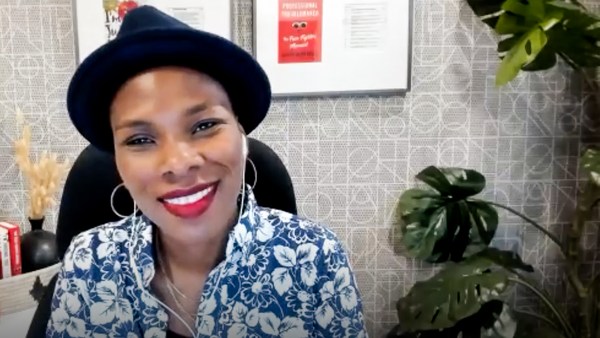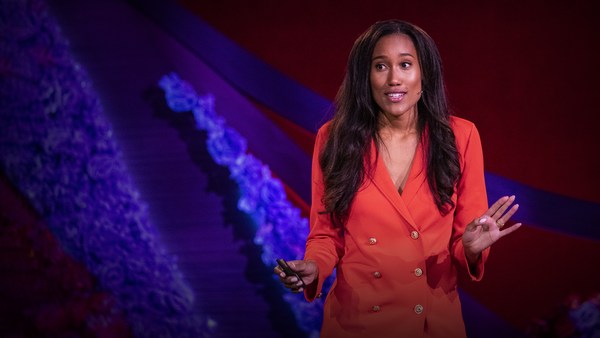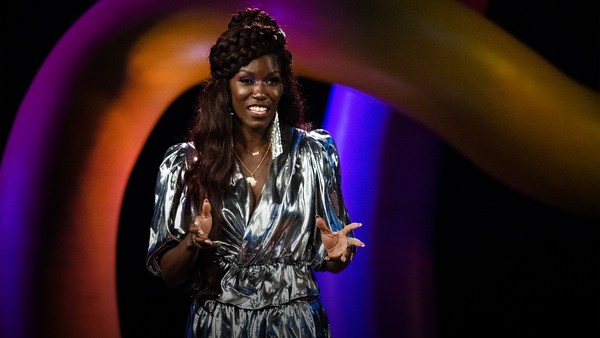You know, everywhere in the world, the question inevitably comes up: "Do you play basketball?"
(Laughter)
From the neighbor across the street -- "Hey, do you hoop?" -- to the five-foot-seven guy at TSA PreCheck --
(Laughter)
that swore that he could beat me one on one.
(Laughter)
I despise fitting into the lane or the mold that this question insinuates. But I reluctantly say, “Yes.” I am a two-time NCAA champion.
(Cheers)
(Applause)
Thank you.
A two-time gold medalist and a two-time --
(Applause)
A two-time WNBA champion.
(Cheers)
But inside I scream, "I am so much more."
(Applause)
You see, barrier breaking is about not staying in your lane and not being something that the world expects you to be. It's about not accepting limitations. It starts with inspiration, and it's a foundation built upon picking apart what everybody thinks is the right way to do things. There are so many barrier breakers in here that are fighting so hard to unlock doors that they may never walk through, but they do it anyway because we're standing on the shoulders of those that did it for us. It's an uphill battle, and it doesn't guarantee big wins or lots of success. And throughout that uphill battle, I think all of us look for hope, right? We all look for optimism. And mine is my daughter and this next generation.
You see, I get to be the mom to an amazing 12-year-old daughter. Yes, I know. I am partial.
(Laughter)
But she's pretty dope. I've been fortunate enough to travel the world with her while she allows her mom to fight for her dreams. We've played in Russia, and I say we because she really does think she's part of the team.
(Laughter)
We played in Russia, Turkey, China. And throughout that journey, I thought I would be the one teaching her, challenging her, being the example for her. But I’ve realized it’s a two-way street. You see, at three years old, I decided to enroll her in school in Russia. I was like, I wanted her to have a normal life, right? I want her to be able to meet kids her age. So at three, she befriended this little girl. Her name was Masha. Masha didn't speak any English. Lailaa barely spoke Russian, but her parents invited us over to their house. And so we went. We went for this playdate. So we knock on the door, and Masha's parents open the door so graciously and welcome us into their home. And we step forward, and I realize there’s no floor. It's a modest home. It's one room with a couch on the side that pulls out into the bed that they sleep on. There's a wood fire oven in the middle that heats the room and that they cook with. And at three years old, I was concerned. So I go to grab Lailaa, but I was too late. She looked in the corner and she said, “A dollhouse!” And Masha and Lailaa ran to the corner to play with the dollhouse. I'm so proud that that's my kid, and I can't say that I had much to do with that. She has a way of like uniting people, finding commonality, of rolling with the punches, of making the best of situations.
I’ve always wanted to uplift her, because the messaging that I received from home was never shrink yourself to fit into this world, that you're enough, that everyone is enough, but you need to be individually you all the time. I was fortunate to grow up in an environment with my parents and my two brothers who empowered me every single day. They told me I can do anything I set my mind to, so much so that my nickname was “Can Do.”
(Laughter)
And it was later extended by my brothers to “Can Do Anything And Get Away With It.”
(Laughter)
I was the baby of the family. Yes, I was the baby, and I didn't lack confidence. If I wasn't kicking the ball out of the recess school parking lot in a dress, to my moms despise, or high, high in the trees. I loved to compete. At everything, not just in sports, either. This one time my teacher in elementary school, he said, "I want to know who can learn the helping verb song the fastest.
(Sings)
(Laughter)
I love to compete. I was that kid. I was that kid.
(Applause)
But what I loved so much was that I was allowed to be me. I was allowed to compete. I was allowed to speak my mind. My parents encouraged that. Just because you're a girl, you don't have to stay in a certain lane.
And then something happened in 1997. The women’s professional basketball league started. The WNBA had its inaugural season when I was 11 years old, and I saw people that looked like me playing the game that I loved so much. I no longer had to go out in the driveway and try to dunk like Michael Jordan. I could go out and get buckets like Cynthia Cooper.
(Applause)
You see, my parents encouraged sports because sports in their eyes was a microcosm of life. You learn to win. You learn to lose. You learn to work through obstacles. You learn to get up when you don't want to. You learn to value differences, because those are important. But as I ventured out into the world, I realized, like, the world wasn't so uplifting towards differences, right? The world had a way of ... putting differences in a box.
For instance, I received my girls basketball uniform in middle school. It was old and smelly and tight. The boys got brand new ones. My brother worked his butt off to get into one of the most prestigious medical schools in the country. My family was so proud. We heard the whispers: they said, “Quotas.” The world had a way of just putting differences in a box and then getting mad when we had the audacity to not fit. Just as an individual, you get mad at me for not fitting in the box that you made.
There was a time that went by where ... I didn't want to say yes to the basketball question. Because if I checked that box, then I checked all of their other assumptions, right? So competitive juices kicked in. I'll show you, I'll show you. I'm going to be the best. Girls can't dunk in a game? I'll dunk twice.
(Applause)
You can't hold up an MVP trophy pregnant? OK, I'll show you. You can't have a family, a career and nurse your daughter. I came back nine weeks post-delivery and I played in a game, and I nursed my daughter for 13 months.
(Applause)
You can't be on the cover of a video game. You can’t do a TED Talk as an athlete.
(Cheers)
(Applause)
But this entire time, my idea of breaking barriers was being something so that the world could see that it was possible. But breaking down barriers isn't always records.
In [2021], like most of you, I sat around the television because I knew this was a moment. I sat my daughter front and center. I said, "Lailaa, watch this." The first African-American Asian Vice President was being sworn in. This is a moment that you might not appreciate now.
(Applause)
But in time you will. And as Kamala Harris was being sworn in, I said, “Lailaa, now look at her. Now you can do that too.”
And Lailaa looked at me. She looked through my eyes, and she said, “Why couldn’t I before?”
(Laughter)
(Applause)
Suddenly, I felt this big because I had become what I despised the most in this world. I had put her in a box because you see, the story that the world told me was women aren’t Vice Presidents. And I had assumed that that's what they had told my daughter. I'm telling you, Generation Z, my daughter's generation, they're changing the world, they're changing the world through conversation, through unity and through living as though boxes and barriers don't exist. It's no longer enough to just put your head down. Get the job. Accomplish the feat. We have to unite, to come together, to figure out why barriers are there in the first place. And Generation Z is doing that. They're listening. They're seeing both sides. And they're uniting for causes that don't directly impact them. We have entire sports leagues that are standing up for what they believe in. It's no longer just one athlete. We have men that are fighting for women to receive equal pay. We have white allies that are protesting racial inequalities. We are talking about mental health.
And you know what's so special? My daughter the other week came up and handed me a list of stores that we're not allowed to shop at anymore.
(Laughter)
I’m like, “Lailaa, like, another lesson, like, already?” She's like, "Mom, we're not allowed to shop at these stores because they're not body positive and body conscious towards all shapes and sizes.”
(Applause)
And you know what, I'm listening, I'll be honest, and I'm learning, and you should, too, because my optimism lies in the next. That they will take our obstacles, our struggles, our insecurities, our challenges and not see them as obstacles, but as opportunities. Or they may not even acknowledge them at all.
I'm proud because Generation Z are proud, bold, and they're themselves. Because those ... that were told that they can't their entire life are having kids that are making us believe that we can.
So go ahead, ask me if I play basketball, and I’ll proudly say, “Yes.” Because I realize I was the one putting basketball in a box all along.
Thank you so much for this opportunity.
(Cheers)
(Applause)


